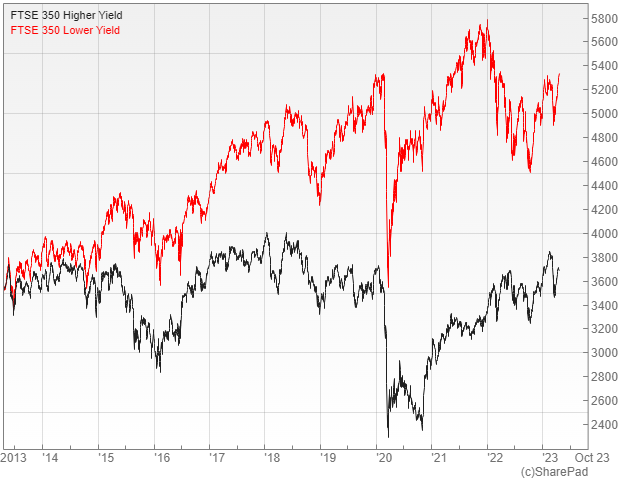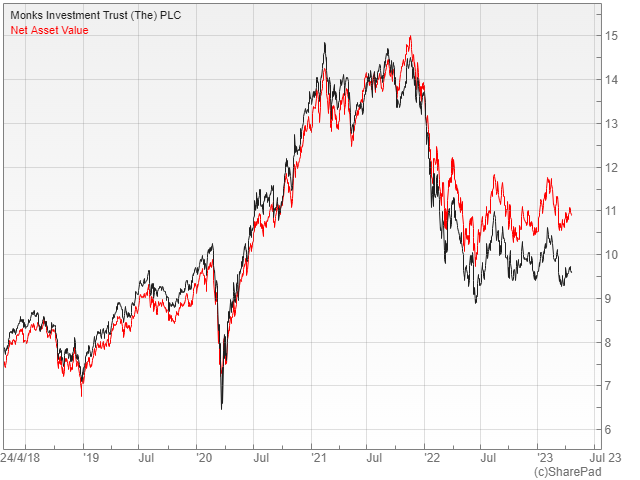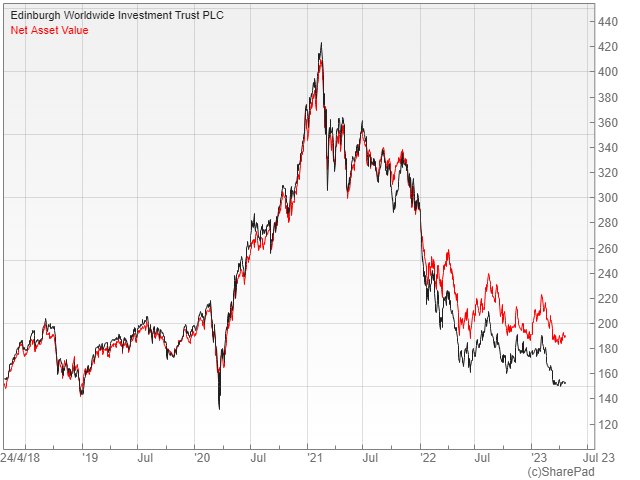Where Next For The Growth-Focused Investment Trusts?

Growth investing has outperformed value for more than a decade, but the significant recent shift in the macro environment has resulted in a massive change in fortunes. The sharp rise in interest rates to tackle inflation has reduced the present value of the future cash flows of these companies and led to material write downs in their valuations.
There is obviously a huge degree of uncertainty about what is going to happen to interest rates, with the IMF recently forecasting that they will slip back to pre-pandemic levels once inflation is tamed, although there have been plenty of periods in history when this has taken longer than expected.
Lower rate expectations could well be the trigger for growth to come back into favour, or it could just come down to the valuations. It is entirely possible that the earnings multiples will contract to the point where they draw people back in, especially when combined with the wide discounts on the popular investment trusts that specialise in this area.
Growth Versus Value
Growth companies are those that are expected to grow at an above-average rate compared to their industry or the broader market, whereas value stocks are shares that are priced below their intrinsic value. The former are more sensitive to higher interest rates as their profits stretch further into the future, especially the more speculative businesses that need to achieve sufficient scale just to become profitable.
Using the FTSE 350 Lower Yield index as a proxy for growth and its high yield equivalent as a measure of value, it is clear that growth has massively outperformed during the low interest rate environment of the past decade. Over the last two years however, as rates have risen sharply, value has started to make up some of the lost ground.

It would appear that the current uncertain environment would suit active stock pickers with a focus on resilience rather than a pure growth or value remit. However, it is possible that for anyone with a five year plus horizon, the compounding nature of growth investing could make it the better option, especially after the write-downs of the last year or so.
Baillie Gifford
The best known and most successful growth manager in recent years has been Baillie Gifford, whose funds often topped the performance tables. Unfortunately the change in the macro environment has provided a real headwind for them with many of their mandates suffering significant losses.
Many firms would have changed their approach, but Baillie Gifford is renowned for ‘thinking in decades, not quarters’ and has stuck to its tried and tested growth strategy despite the sharp reversal in fortunes. The broker Winterflood has recently met with the managers of some of their largest global investment trusts to assess their perspectives and prospects.
They have come up with some interesting analysis in respect of three of their most popular funds: Scottish Mortgage (LON: SMT), Monks (LON: MNKS) and Edinburgh Worldwide (LON: EWI). As you would expect, they all exhibit a clear growth bias, although the latter focuses on the small cap end of the spectrum, while Monks has the more conservative mandate.
Scottish Mortgage
Scottish Mortgage is the flagship fund managed by Baillie Gifford and dates back to the founding of the firm in 1909. It is the second-largest offering in the investment trust universe, behind 3i Group (LON: III), with total assets of £13.4bn.
The managers aim to identify ‘the world’s most exceptional growth companies’ on an unconstrained basis, across the global listed and private investable universe. They have consistently focused on outliers with long-term transformative potential over investment horizons of five to ten years.
Typically the portfolio contains 50 to 100 holdings, although 78.6% of the NAV is currently concentrated in the 30 largest positions. According to Winterflood, over the last two decades, the vast majority of performance has been driven by less than five percent of the holdings, because of the huge impact of the likes of Amazon, Tesla, Tencent and ASML.
One of the most contentious issues is that the allocation to private companies is close to the fund’s 30% policy limit, which means that no new additions to this area are permitted in the absence of private exits or a positive re-rating of the publicly listed holdings. Concerns have been raised as to whether the valuations of these stocks are correct and whether the fund has the capacity to properly oversee them, which has triggered a boardroom shakeup.
SMT shares peaked at over £15 in November 2021, but have since slid to less than seven pounds, a fall of more than 50%. The discount to NAV has also widened considerably and now stands at around 20%.
The broker Winterflood says that despite this the long-term returns remain outstanding and the recent pullback offers an attractive entry point, with the discount exceeding its 20-year low. They do however qualify their recommendation, saying that the fund is most suitable for people with a particularly long investment horizon, significant risk appetite and a desire for private exposure.

Monks
Monks was established in 1929 and since 2015 has been managed in line with Baillie Gifford’s Global Alpha strategy, which has a total of £37bn in assets under management. The investment team includes a dedicated ESG analyst and also makes use of the firm’s other fund managers to provide ideas within their regional specialisation, as well as feedback on the portfolio as a whole.
It has a very different approach to Scottish Mortgage, with the aim being to generate long-term capital growth by patiently investing in a diversified range of growth stocks. The managers describe the strategy as relatively conservative, which is why the average holding period is close to 10 years.
There are typically over 100 stocks in the portfolio and these can be classified into three main areas of roughly equal size. The first of these are the growth stalwarts, which are defined as durable franchises with a strong ‘moat’; next up are the rapid growth companies that include innovative disruptors with vast opportunities; while the final category consists of cyclical growth stocks, which help to support the portfolio through the economic cycle.
The fund has experienced a sharp sell-off in the last couple of years, during which the valuation multiples in the rapid growth allocation collapsed, despite the strong operational performance. As a result of this the shares have slid to a wide 12% discount to NAV, which is close to a 10 year low.
Monks is one of Winterflood’s recommendations for the year due to its ‘conservative’ growth approach and attractive valuation. They think that the quality of management and broad exposure will mean that it will be less volatile and more defensive than Scottish Mortgage in periods when growth is out of favour.
The broker believes that the fund remains attractive on a long-term view, given its diversification and the inclusion of a range of growth themes that are not interdependent. This is amplified by the wide discount, with Monks remaining their favoured pick in the global sector. The shares are down 30% in the last two years.

Edinburgh Worldwide
Edinburgh Worldwidewas launched in 1998 and since 2014 has been managed in line with Baillie Gifford’s Global Discovery strategy.The fund invests in global smaller companies with market values of less than $5bn and targets businesses that are nimble in decision-making and technology adoption, with the aim being to benefit from this dynamic stage of their lifecycle.
Normally the portfolio has between 75 and 125 holdings, with 38% of the NAV currently concentrated in the 10 largest positions. It is a global mandate, although the majority of the assets – 71% by value – are located in the US, as the managers often see prospective target companies in other regions having strong local, rather than global, impact potential.
Up to a quarter of the fund can be invested in unlisted companies, with the current allocation being 20.4%. This is used as a way to access themes that are not available via the public markets. A good example is PsyQuantum, which provides a unique exposure to quantum computing, with an advantage in scalability due to its differentiated use of semiconductors.
EWI outperformed its S&P Global Small Cap benchmark from 2017 to 2020, but since then its growth bias has been a headwind, although the managers claim that this part of the market has been impacted indiscriminately by the macro uncertainty. Over the last two years the shares are down almost 60% and they currently trade at a much wider discount to NAV of around 19%.
The Board has not set an explicit discount target, but it does seek to repurchase shares when the discount is ‘substantial in absolute terms and relative to its peers’. In total it bought back £27m of shares in 2022 with a further £3m in the first two months of 2023.
Douglas Brodie and his fellow managers accept that in the current macro environment, investing in global growth stocks, particularly the small caps, can be uncomfortable, although they believe that the fundamentals will reassert themselves.
Winterflood says that EWI is well and truly out of favour, but its growth bias and smaller companies focus should allow the fund to be an early beneficiary of a rising tide, if and when this arrives. They can’t see a clear near-term catalyst for a re-rating, but point out that some long-term investors may view the wide discount as an attractive entry point.

Comments (0)